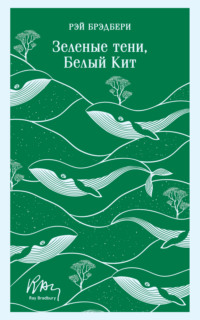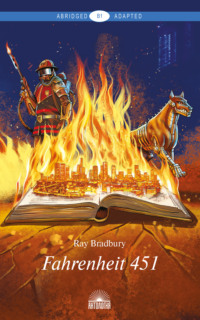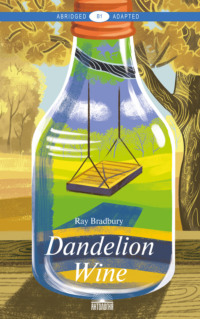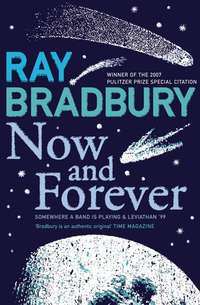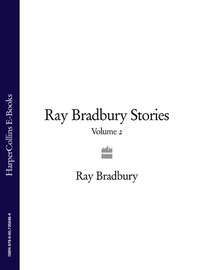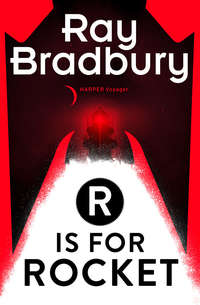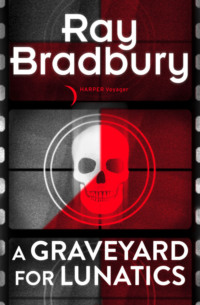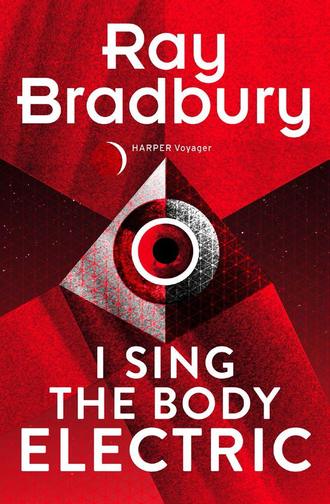
Полная версия
I Sing the Body Electric
“No?” said Booth, stunned.
“No, Mr. Booth. No pictures. No coast-to-coast TV. No magazines. No columns. No papers. No advertisement. No glory. No fame. No fun. No self-pity. No resignation. No immortality. No nonsense about triumphing over the dehumanization of man by machines. No martyrdom. No respite from your own mediocrity. No splendid suffering. No maudlin tears. No renunciation of possible futures. No trial. No lawyers. No analysts speeding you up this month, this year, thirty years, sixty years, ninety years after, no stories with double spreads, no money, no.”
Booth rose up as if a rope had hauled him tall and stretched him gaunt and washed him pale.
“I don’t understand. I—”
“You went to all this trouble? Yes. And I’m ruining the game. For when all is said and done, Mr. Booth, all the reasons listed and all the sums summed, you’re a has-been that never was. And you’re going to stay that way, spoiled and narcissistic and small and mean and rotten. You’re a short man and I intend to squash and squeeze and press and batter you an inch shorter instead of force-growing you, helping you gloat nine feet tall.”
“You can’t!” cried Booth.
“Oh, Mr. Booth,” said Bayes, on the instant, almost happy, “I can. I can do anything with this case I wish, and I wish not to press charges. More than that, Mr. Booth, it never happened.”
The hammering came again, this time on a locked door up on the stage.
“Bayes, for God’s sake, let me in! This is Phipps! Bayes! Bayes!”
Booth stared at the trembling, the thundershaken, the rattling door, even while Bayes called very calmly and with an ease that was beautiful:
“Just a moment.”
He knew that in a few minutes this calm would pass, something would break, but for now there was this splendidly serene thing he was doing; he must play it out. With fine round tones he addressed the assassin and watched him dwindle and spoke further and watched him shrink.
“It never happened, Mr. Booth. Tell your story, but we’ll deny it. You were never here, no gun, no shot, no computerized data-processed assassination, no outrage, no shock, no panic, no mob. Why now, look at your face. Why are you falling back? Why are you sitting down? Why do you shake? Is it the disappointment? Have I turned your fun the wrong way? Good.” He nodded at the aisle. “And now, Mr. Booth, get out.”
“You can’t make—”
“Sorry you said that, Mr. Booth.” Bayes took a soft step in, reached down, took hold of the man’s tie and slowly pulled him to his feet so he was breathing full in his face.
“If you ever tell your wife, any friend, employer, child, man, woman, stranger, uncle, aunt, cousin, if you ever tell even yourself out loud going to sleep some night about this thing you did, do you know what I am going to do to you, Mr. Booth? If I hear one whisper, one word, one breath, I shall stalk you, I shall follow you for a dozen or a hundred or two hundred days, you’ll never know what day, what night, what noon, where, when or how but suddenly I’ll be there when you least expect and then do you know what I am going to do to you, Mr. Booth? I won’t say, Mr. Booth, I can’t tell. But it will be awful and it will be terrible and you’ll wish you had never been born, that’s how awful and terrible it will be.”
Booth’s pale face shook, his head bobbed, his eyes peeled wide, his mouth open like one who walks in a heavy rain.
“What did I just say, Mr. Booth? Tell me!”
“You’ll kill me?”
“Say it again!”
He shook Booth until the words fell out of his chattered teeth:
“Kill me!”
He held tight, shaking and shaking the man firmly and steadily, holding and massaging the shirt and the flesh beneath the shirt, stirring up the panic beneath the cloth.
So long, Mr. Nobody, and no magazine stories and no fun and no TV, no celebrity, an unmarked grave and you not in the history books, no, now get out of here, get out, run, run before I kill you.
He shoved Booth. Booth ran, fell, picked himself up, and lunged toward a theater door which, on the instant, from outside, was shaken, pounded, riven.
Phipps was there, calling in the darkness.
“The other door,” said Bayes.
He pointed and Booth wheeled to stumble in a new direction to stand swaying by yet another door, putting one hand out—
“Wait,” said Bayes.
He walked across the theater and when he reached Booth raised his flat hand up and hit Booth once, hard, a slapping strike across the face. Sweat flew in a rain upon the air.
“I,” said Bayes, “I just had to do that. Just once.”
He looked at his hand, then turned to open the door.
They both looked out into a world of night and cool stars and no mob.
Booth pulled back, his great dark liquid eyes the eyes of an eternally wounded and surprised child, with the look of the self-shot deer that would go on wounding, being shot by itself forever.
“Get,” said Bayes.
Booth darted. The door slammed shut. Bayes fell against it, breathing hard.
Far across the arena at another locked door, the hammering, pounding, the crying out began again. Bayes stared at that shuddering but remote door. Phipps. But Phipps would have to wait. Now…
The theater was as vast and empty as Gettysburg in the late day with the crowd gone home and the sun set. Where the crowd had been and was no more, where the Father had lifted the Boy high on his shoulders and where the Boy had spoken and said the words, but the words now, also, gone…
On the stage, after a long moment, he reached out. His fingers brushed Lincoln’s shoulder.
Fool, he thought standing there in the dusk. Don’t. Now, don’t. Stop it. Why are you doing this? Silly. Stop. Stop.
And what he had come to find he found. What he needed to do he did.
For tears were running down his face.
He wept. Sobs choked his mouth. He could not stop them. They would not cease.
Mr. Lincoln was dead. Mr. Lincoln was dead!
And he had let his murderer go.
Yes, We’ll Gather at the River
At one minute to nine he should have rolled the wooden Indian back into warm tobacco darkness and turned the key in the lock. But somehow he waited because there were so many lost men walking by in no special direction for no special reason. A few of them wandered in to drift their gaze over the tribal cigars laid out in their neat brown boxes, then glanced up suddenly surprised to find where they were and said, evasively, “Evening, Charlie.”
“So it is,” said Charlie Moore.
Some of the men wandered off empty-handed, others moved on with a nickel cigar unlit in their mouths.
So it was nine thirty of a Thursday night before Charlie Moore finally touched the wooden Indian’s elbow as if disturbing a friend and hating to bother. Gently he maneuvered the savage to where he became watchman of the night. In the shadows, the carved face stared raw and blind through the door.
“Well, Chief, what do you see?”
Charlie followed that silent gaze beyond to the highway that cut through the very center of their lives.
In locust hordes, cars roared up from Los Angeles. With irritation they slowed to thirty miles per hour here. They crept between some three dozen shops, stores, and old livery stables become gas stations, to the north rim of town. There the cars exploded back to eighty, racing like Furies on San Francisco, to teach it violence.
Charlie snorted softly.
A man passed, saw him standing with his silent wooden friend, said, “Last night, eh?” and was gone.
Last night.
There. Someone had dared use the words.
Charlie wheeled to switch off the lights, lock the door and, on the sidewalk, eyes down, freeze.
As if hypnotized, he felt his gaze rise again to the old highway which swept by with winds that smelled a billion years ago. Great bursts of headlight arrived, then cut away in departures of red taillight, like schools of small bright fish darting in the wake of sharks and blind-traveling whales. The lights sank away and were lost in the black hills.
Charlie broke his stare. He walked slowly on through his town as the clock over the Oddfellows Lodge struck the quarter hour and moved on toward ten and still he walked and was amazed and then not amazed anymore to see how every shop was still open long after hours and in every door stood a man or woman transfixed even as he and his Indian brave had been transfixed by a talked-about and dreadful future suddenly become Here Now Tonight.
Fred Ferguson, the taxidermist, kin to the family of wild owls and panicked deer which stayed on forever in his window, spoke to the night air as Charlie passed:
“Hard to believe, ain’t it?”
He wished no answer, for he went on, immediately:
“Keep thinking: just can’t be. Tomorrow, the highway dead and us dead with it.”
“Oh, it won’t be that bad,” said Charlie.
Ferguson gave him a shocked look. “Wait. Ain’t you the one hollered two years ago, wanted to bomb the legislature, shoot the road contractors, steal the concrete mixers and earth-movers when they started the new highway three hundred yards west of here? What you mean, it won’t be bad? It will, and you know it!”
“I know,” said Charlie Moore, at last.
Ferguson brooded on the near distance.
“Three hundred little bitty yards. Not much, eh? But seeing as how our town is only a hundred yards wide, that puts us, give or take, about two hundred yards from the new superroad. Two hundred yards from people who need nuts, bolts, or house-paint. Two hundred from jokers who barrel down from the mountains with deer or fresh shot alley-cats of all sorts and need the services of the only A-l taxidermist on the Coast. Two hundred yards from ladies who need aspirin—” He eyed the drugstore. “Haircuts.” He watched the red-striped pole spin in its glass case down the street. “Strawberry sodas.” He nodded at the malt shop. “You name it.”
They named it all in silence, sliding their gaze along the stores, the shops, the arcades.
“Maybe it’s not too late.”
“Late, Charlie? Hell. Cement’s mixed and poured and set. Come dawn they yank the roadblocks both ends of the new road. Governor might cut a ribbon from the first car. Then … people might remember Oak Lane the first week, sure. The second week not so much. A month from now? We’ll be a smear of old paint on their right running north, on their left running south, burning rubber. There’s Oak Lane! Remember? Ghost town. Oops! It’s gone.”
Charlie let his heart beat two or three times.
“Fred … what you going to do?”
“Stay on awhile. Stuff a few birds the local boys bring in. Then crank the old Tin Lizzie and drive that new superfreeway myself going nowhere, anywhere, and so long to you, Charlie Moore.”
“Night, Fred. Hope you sleep.”
“What, and miss welcoming in the New Year, middle of July…?”
Charlie walked and that voice faded behind and he came to the barbershop where three men, laid out, were being strenuously barbered behind plate glass. The highway traffic slid over them in bright reflections. They looked like they were drowning under a stream of huge fireflies.
Charlie stepped in. Everyone glanced up.
“Anyone got any ideas?”
“Progress, Charlie,” said Frank Mariano, combing and cutting, “is an idea can’t be stopped with no other idea. Let’s yank up the whole damn town, lock, stock, and tar barrel, carry it over, nail it down by that new road.”
“We figured the cost last year. Four dozen stores at three thousand dollars average to haul them just three hundred yards west.”
“So ends that master plan,” muttered someone under a hot-steam towel, buried in inescapable fact.
“One good hurricane would do the job, carriage-free.”
They all laughed quietly.
“We should all celebrate tonight,” said the man under the hot towel. He sat up, revealing himself as Hank Summers, the groceryman. “Snort a few stiff drinks and wonder where the hell we’ll all be this time next year.”
“We didn’t fight hard enough,” said Charlie. “When it started, we didn’t pitch in.”
“Hell.” Frank snipped a hair out of the inside of a fairly large car. “When times move, not a day passes someone’s not hurt. This month, this year, it’s our turn. Next time we want something, someone else gets stepped on, all in the name of Get Up and Go. Look, Charlie, go form a vigilantes. Mine that new road. But watch out. Just crossing the lanes to place the bomb, you’re sure to be run down by a manure truck bound for Salinas.”
More laughter, which faded quickly.
“Look,” said Hank Summers, and everybody looked. He spoke to his own fly-specked image in the ancient mirror as if trying to sell his twin on a shared logic. “We lived here thirty years now, you, me, all of us. Won’t kill us to move on. Good God, we’re all root and a yard wide. Graduation. School of hard knocks is throwing us out the door with no never-mind’s and no thank-you’s. I’m ready. Charlie, are you?”
“Me, now,” said Frank Mariano. “Monday morning six a.m. I load my barbership in a trailer and shoot off after those customers, ninety miles an hour!”
There was a laugh sounded like the very last one of the day, so Charlie turned with one superb and mindless drift and was back on the street.
And still the shops stayed open, the lights stayed on, the doors stood wide, as if each owner was reluctant to go home, so long as that river out there was flowing and there was the great motion and glint and sound of people and metal and light in a tide they had grown so accustomed to it was hard to believe the river bottom would ever know a dry season.
Charlie lingered on, straying from shop to shop, sipping a chocolate Coke at the malted-milk counter, buying some stationery he couldn’t use from the drugstore under the soft fluttering wood fan that whispered to itself in the ceiling. He loitered like a common criminal, thieving sights. He paused in alleys where, Saturday afternoons, gypsy tie salesmen or kitchenware spielers laid out their suitcase worlds to con the pedestrians. Then, at last he reached the gas station where Pete Britz, deep in the oil pit, was mending the dumb brute underside of a dead and uncomplaining 1947 Ford.
At ten o’clock, as if by some secret but mutual consent, all the shops went dark, all the people walked home, Charlie Moore among them.
He caught up with Hank Summers, whose face was still shining pink from the shave he hadn’t needed. They ambled in silence for a time past houses where it seemed the whole population was sitting out smoking or knitting, rocking in chairs or fanning themselves against a nonexistent hot spell.
Hank laughed suddenly at some private thought. A few paces on, he decided to make it public:
“Yes, we’ll gather at the River.
River, River.
Yes, we’ll gather at the River
That flows by the Throne of God.”
He half-sang it and Charlie nodded.
“First Baptist Church, when I was twelve.”
“The Lord giveth and the Highway Commissioner taketh away,” said Hank, drily. “Funny. Never thought how much a town is people. Doing things, that is. Under the hot towel back there, thought: what’s this place to me? Shaved. I had the answer. Russ Newell banging a carburetor at the Night Owl Garage? Yep. Allie Mae Simpson…”
He swallowed his voice in embarrassment.
Allie Mae Simpson … Charlie took up the count in his own mind … Allie Mae fixing wet curlicues in old ladies’ hair in the bay window of her Vogue Salon … Doc Knight stacking pill bottles in the drug emporium cases … hardware store laid out in the hot noon sun, Clint Simpson middle of it all, running his hands over, sorting out the million blinks and shines of brass and silver and gold, all the nails, hinges, knobs, all the saws, hammers, and snaked up copper wire and stacks of aluminum foil like the junk shaken free of a thousand boys’ pockets in a thousand summers past … and then…
…then there was his own place, warm dark, brown, comfortable, musky as the den of a tobacco smoking bear … thick with the humidor smells of whole families of odd-sized cigars, imported cigarettes, snuffs just waiting to be exploded on the air…
Take all that away, thought Charlie, you got nothing. Buildings, sure. Anyone can raise a frame, paint a sign to say what might go on inside. But it was people that made the damn thing get.
Hank surfaced in his own long thoughts.
“Guess right now I’m sad. Want to send everyone back to open their shops so I can see what they were up to. Why wasn’t I looking closer, all these years? Hell, hell. What’s got into you. Hank Summers. There’s another Oak Lane on up the line or down the line and people there busy as they are here. Wherever I land, next time I’ll look close, swear to God. Good-bye, Charlie.”
“To hell with good-bye.”
“All right, then, good night.”
And Hank was gone and Charlie was home and Clara was waiting at the screen door with a glass of ice water.
“Sit out awhile?”
“Like everyone else? Why not?”
They sat in the dark on the porch in the chain-hung wooden swing and watched the highway flush and drain, flush and drain with arrivals of headlight and departures of angry red fire like the coals from an immense brazier scattered to the fields.
Charlie drank the water slowly and. drinking, thought: In the old days you couldn’t see the roads die. You felt them gradually fade, yes, lying in bed nights, maybe your mind got hold of some hint, some nudge or commotion that warned you it was sinking away. But it took years and years for any one road to give up its dusty ghost and another to stir alive. That’s how things were, slow arriving and slow passing away. That’s how things had always been.
But no more. Now, in a matter of hours.
He paused.
He touched in upon himself to find a new thing.
“Good,” said his wife.
They rocked awhile, two halves of a similar content.
“My God, I was stirred up there for awhile.”
“I remember,” she said.
“But now I figure, well…” he drifted his voice, mostly to himself. “Millions of cars come through every year. Like it or not, the road’s just not big enough, we’re holding up the world, that old road there and this old town. The world says it’s got to move. So now, on that new road, not one but two million will pass just a shotgun blast away, going where they got to go to get things done they say are important, doesn’t matter if they’re important or not, folks think they are, and thinking makes the game. If we’d really seen it coming, thought in on it from every side, we’d have taken a steam-driven sledge and just mashed the town flat and said. ‘Drive through!’ instead of making them lay the damn road over in that next clover patch. This way, the town dies hard, strangled on a piece of butcher string instead of being dropped off a cliff. Well, well.” He lit his pipe and blew great clouds of smoke in which to poke for past mistakes and present revelations. “Us being human, I guess we couldn’t have done but as we did…”
They heard the drugstore clock strike eleven and the Oddfellows Hall clock chime eleven thirty, and at twelve they lay in bed in the dark, each with a ceilingful of thoughts above them.
“Graduation.”
“What?”
“Frank the barber said it and had it right. This whole week feels like the last days of school, years ago. I remember how I felt, how I was afraid, ready to cry, and how I promised myself to live every last moment right up to the time the diploma was in my hand, for God only knew what tomorrow might bring. Unemployment. Depression. War. And then the day arrived, tomorrow did get around to finally coming, and I found myself still alive, by God, and I was still all in one piece and things were starting over, more of the same, and hell, everything turned out okay. So this is another graduation all right. Frank said, and I’m the last to doubt.”
Конец ознакомительного фрагмента.
Текст предоставлен ООО «ЛитРес».
Прочитайте эту книгу целиком, купив полную легальную версию на ЛитРес.
Безопасно оплатить книгу можно банковской картой Visa, MasterCard, Maestro, со счета мобильного телефона, с платежного терминала, в салоне МТС или Связной, через PayPal, WebMoney, Яндекс.Деньги, QIWI Кошелек, бонусными картами или другим удобным Вам способом.


